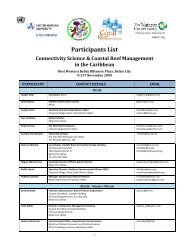The Global Water Crisis: Addressing an Urgent Security - Unu-inweh ...
The Global Water Crisis: Addressing an Urgent Security - Unu-inweh ...
The Global Water Crisis: Addressing an Urgent Security - Unu-inweh ...
Create successful ePaper yourself
Turn your PDF publications into a flip-book with our unique Google optimized e-Paper software.
5. <strong>The</strong> Potential for Conflict <strong>an</strong>d the Exploding Time Bomb<br />
Ch<strong>an</strong>ges in fundamental hydrology are likely to cause new kinds of conflict, <strong>an</strong>d it c<strong>an</strong> be expected that both water<br />
scarcity <strong>an</strong>d flooding will become major tr<strong>an</strong>sboundary water issues. At present, it is estimated that perhaps 25% of the<br />
world’s major river basins run dry for part of each year (Solomon, 2010). New conflicts are likely to emerge as more of the<br />
world’s rivers become further heavily abstracted so that they no longer make it to the sea. <strong>The</strong> prospect of the kinds of<br />
floods that were witnessed in Pakist<strong>an</strong> <strong>an</strong>d Australia in 2010 <strong>an</strong>d on the Great Plains of North America in 2011 suggests<br />
that the destruction of upstream flood protection <strong>an</strong>d the failure to provide adequate downstream flood warning will<br />
enter into global conflict formula in the future. But is it not just floods that are likely to cause conflict. Prolonged drought<br />
as was experienced in the Horn of Africa in 2011 suggests that tensions will rise on both ends of the hydrological scale.<br />
What this ch<strong>an</strong>ging hydrology signifies is that it is unwise to take too isolated a view of what the <strong>an</strong>ticipated impacts of<br />
climate ch<strong>an</strong>ge will be or me<strong>an</strong>. In C<strong>an</strong>ada, the thinking surrounding climate ch<strong>an</strong>ge remains linear: m<strong>an</strong>y still think the<br />
effects of climate ch<strong>an</strong>ge will be local, minor <strong>an</strong>d cumulative. In fact, it will not be long before climate ch<strong>an</strong>ge affects<br />
everyone, everywhere, simult<strong>an</strong>eously compounding every regional economic, social <strong>an</strong>d political disparity. As this<br />
happens, it c<strong>an</strong> be expected that the potential for general tensions <strong>an</strong>d conflict over water will rise.<br />
What hum<strong>an</strong>s have collectively done over time is to have quite accidentally – unwittingly, in fact – created a hydro-climatic<br />
time bomb. <strong>The</strong> bomb has already started to tick, but no one knows when it will go off. In order to avoid conflict, society<br />
needs to come up with solutions to quickly defuse this increasingly alarming situation.<br />
One immediate partial solution to this problem is water conservation. It is widely accepted that water, energy <strong>an</strong>d climate<br />
are linked. This realization suggests that head-turning economic benefits c<strong>an</strong> accrue to governments <strong>an</strong>d the people they<br />
serve by way of water conservation. However, in m<strong>an</strong>y parts of the developed world, wasteful water use is still accepted<br />
<strong>an</strong>d encouraged as a social norm. At enormous public cost, water infrastructure has been overbuilt in order to support<br />
this wasteful norm. However, it has now become apparent that we c<strong>an</strong>not afford to maintain <strong>an</strong>d replace the overbuilt<br />
infrastructure that supports this waste, which increases the risk of public health threats <strong>an</strong>d leaves societies in a very<br />
vulnerable position.<br />
It has become apparent that enormous amounts of energy are wasted treating <strong>an</strong>d moving water. <strong>The</strong> cost of energy<br />
is rising <strong>an</strong>d cities are discovering that they c<strong>an</strong>’t afford to spend up to 60% of their municipal energy budgets to move<br />
water to where it is being used profligately. In addition, there is the realization that this wasted energy for the purpose of<br />
wasting water is accelerating climate ch<strong>an</strong>ge, which in turn is accelerating damage to the infrastructure that cities c<strong>an</strong>’t<br />
afford to maintain or replace.<br />
This has, unwittingly, created a positive climate ch<strong>an</strong>ge feedback loop – <strong>an</strong> obviously vicious circle that is simult<strong>an</strong>eously<br />
b<strong>an</strong>krupting societies while compounding climate ch<strong>an</strong>ge effects. This cycle will accelerate until improved water conservation<br />
measures are implemented <strong>an</strong>d practiced by society at large, <strong>an</strong>d a sense of responsibility <strong>an</strong>d ownership are undertaken<br />
for securing water for the future.<br />
<strong>The</strong> increase in the severity <strong>an</strong>d number of storms has already been noticed by the industry. Insurers are particularly<br />
worried about the rapidly increasing rate of water-damage claims (MacGregor, 2011). In a special report on m<strong>an</strong>aging<br />
the risks of extreme events <strong>an</strong>d disasters, the Intergovernmental P<strong>an</strong>el on Climate Ch<strong>an</strong>ge echoed the concerns of the<br />
insur<strong>an</strong>ce industry, claiming in addition that extreme weather events will have greater impacts on sectors with closer<br />
links to climate, such as water, agriculture <strong>an</strong>d food security, forestry, health <strong>an</strong>d tourism (IPCC, 2012). <strong>The</strong> report also<br />
went on to point out that opportunities exist to create synergies in international fin<strong>an</strong>ce for disaster risk m<strong>an</strong>agement<br />
<strong>an</strong>d adaptation to climate ch<strong>an</strong>ge, but that these have not yet been fully realized (IPCC, 2012).<br />
<strong>The</strong> wastefulness of some developed countries with respect to water <strong>an</strong>d related energy use puts into relief the challenge<br />
we face in supplying water to the 1 billion people on earth who do not have a safe <strong>an</strong>d reliable daily supply. It also speaks to<br />
the challenge of serving the additional 2 billion people on this pl<strong>an</strong>et who do not have daily access to adequate s<strong>an</strong>itation.<br />
Industry examples suggest that for every dollar saved in water use in the developed world, as much as four dollars more<br />
is saved on chemical, electricity <strong>an</strong>d energy costs (Fishm<strong>an</strong>, 2011). If such savings could somehow be directed in part<br />
towards water infrastructure development in the developing world, the improvements in hum<strong>an</strong> well-being would go a<br />
long way in reducing the potential for conflict over matters of water supply <strong>an</strong>d quality in the future.<br />
Will the Next Wars Be Fought Over <strong>Water</strong>?<br />
Part 1<br />
15




